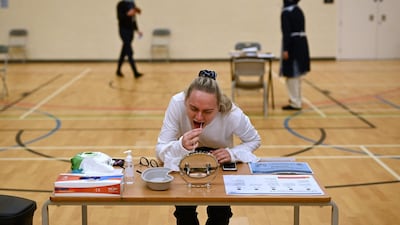International pupils who attend boarding schools in England will be able to isolate at school rather than at a government-approved hotel for 10 days.
Schools will have to have travel plans in place, including arrangements for the collection and transfer of pupils from the airport to the boarding areas where they will quarantine.
Children who have travelled from a red-list country must then quarantine in “physically self-contained” accommodation at the school.
There are 33 countries on the red list, including South Africa, the UAE and most of South America.
The UK government faced pressure from parents and head teachers to change the rules.
The first passengers to stay at the hotels were allowed to leave last week. Travellers who avoid quarantine can be fined up to £10,000 ($13,893).
The Boarding Schools Association wrote to the government to say hotel quarantine arrangements posed “a significant safeguarding risk”.
The letter said rules for the self-isolation for travellers, which came into effect on February 15, could lead to minors in hotel rooms alone or with adults they did not know.
Last month, parents of children travelling back to school in the UK pleaded with the government to rethink the rules.
The government said parents should quarantine with their children in a hotel, and if family members could not accompany pupils they were advised not to travel.
But Department for Education guidance, published days before schools reopen in England, now says pupils can return directly to their boarding school if conditions are met.
It said checks would be made to ensure schools complied with the rules.
If duties are not met, action may include “suspending or permanently removing a school’s ability to sponsor student visas and child student visas”.
The guidance applies to British citizens only.
"Anyone who is not a British or Irish national, or who does not have the right to reside in the UK, who has travelled from or through a ‘red list’ country in the previous 10 days, is not permitted to enter the UK and should be told not to travel," the department said.
Rules of transport to the school include that it must be a motor vehicle and cannot be public transport.
It must be transport that has been arranged by the school or college in England at which the student or pupil is to attend.

The Boarding Schools Association, which represents 500 schools across the UK, estimates that up to 3,000 students are in red-list countries and need to travel back to England for school.
It is still working with the Scottish, Welsh and Northern Irish authorities about future changes.
“This is excellent news for our member schools and we’re grateful to the Department for Education for its support," said Robin Fletcher, the association's chief executive.
“Boarding schools are self-contained bubbles. Our experience of the previous lockdown tells us that any Covid cases can be managed carefully, limiting the risk of cases spreading to an absolute minimum.
“It also means students are being cared for and supported by schools’ pastoral staff, ensuring their safety and well-being.
“We hope the same arrangements can be put in place for students in Wales, Scotland and Northern Ireland, and we will be continuing our efforts for this to happen.”
Independent Schools Council chief executive Julie Robinson said: “We are delighted that this guidance enables all international boarders to return to school if they are able to, and appreciate the strict conditions imposed on boarding houses to make it possible.”





















